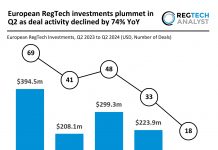In April 2024, the European Parliament endorsed the Corporate Sustainability Due Diligence Directive (CSDDD), marking a pivotal advancement in sustainable and ethical corporate conduct.
According to Moody’s, the directive’s principal objective is to foster responsible corporate actions and incorporate human rights and environmental considerations into corporate operations and governance. It mandates that companies undertake due diligence to pinpoint, prevent, and mitigate risks associated with human rights and environmental issues within their supply chains, addressing any negative impacts of their operations both within and outside of Europe.
This legislative step underscores a commitment to corporate social responsibility across EU-invested supply chains, a process that began four years prior.
At the heart of the directive is the obligation for businesses to conduct comprehensive human rights and environmental due diligence. This includes assessing risks among suppliers and partners to prevent adverse impacts on human rights and the environment. The directive mandates businesses to hold themselves accountable for any negative outcomes of their activities, implement preventative measures, and monitor as well as report on their effectiveness.
Additionally, it necessitates engaging with stakeholders like workers and local communities to ensure their concerns are factored into corporate practices, thereby promoting responsible business operations and reducing environmental harm.
The directive is structured around five key pillars: policy formation covering risks such as forced labor and discrimination; risk analysis to define and mitigate potential threats; risk management, including the appointment of a Human Rights Officer; the establishment of a complaints mechanism; and transparent annual reporting on the impact of business activities on human rights.
This framework not only helps in identifying human rights violations but also aids in mitigating other associated risks like money laundering.
The legislative groundwork for the CSDDD started in 2020, following studies by the European Commission on sustainable corporate governance, which highlighted the necessity for stringent due diligence. The journey saw various drafts and revisions to accommodate concerns about the administrative burden on companies.
Despite some initial resistance, adjustments were made, such as raising employee and revenue thresholds for compliance, and narrowing the scope to exclude indirect business partners from certain obligations.
Despite these reductions, the directive is ambitious. It will impact approximately 5,000 companies across the EU, with phased compliance deadlines extending through 2029 depending on company size. This gradual implementation reflects the significant challenges and high stakes associated with third-party risk management, which is crucial for regulatory compliance, operational resilience, and corporate reputation.
To meet these requirements, a unified and automated approach to due diligence is essential. Companies must leverage technology to conduct thorough risk assessments and maintain continuous monitoring of their supply chains. Moody’s offers solutions that help streamline these processes, integrating data and technology to enhance transparency and manage risks effectively.
Ultimately, the adoption of the CSDDD is a milestone in promoting more ethical business practices that safeguard human rights and the environment. By establishing stricter due diligence requirements, the EU aims to ensure that companies are held accountable for their impact on society and the planet.
This directive, along with effective risk management solutions, seeks to cultivate a more sustainable and ethical business landscape in Europe and globally.
Keep up with all the latest FinTech news here.
Copyright © 2024 FinTech Global
According to Moody’s, the directive’s principal objective is to foster responsible corporate actions and incorporate human rights and environmental considerations into corporate operations and governance. It mandates that companies undertake due diligence to pinpoint, prevent, and mitigate risks associated with human rights and environmental issues within their supply chains, addressing any negative impacts of their operations both within and outside of Europe.
This legislative step underscores a commitment to corporate social responsibility across EU-invested supply chains, a process that began four years prior.
At the heart of the directive is the obligation for businesses to conduct comprehensive human rights and environmental due diligence. This includes assessing risks among suppliers and partners to prevent adverse impacts on human rights and the environment. The directive mandates businesses to hold themselves accountable for any negative outcomes of their activities, implement preventative measures, and monitor as well as report on their effectiveness.
Additionally, it necessitates engaging with stakeholders like workers and local communities to ensure their concerns are factored into corporate practices, thereby promoting responsible business operations and reducing environmental harm.
The directive is structured around five key pillars: policy formation covering risks such as forced labor and discrimination; risk analysis to define and mitigate potential threats; risk management, including the appointment of a Human Rights Officer; the establishment of a complaints mechanism; and transparent annual reporting on the impact of business activities on human rights.
This framework not only helps in identifying human rights violations but also aids in mitigating other associated risks like money laundering.
The legislative groundwork for the CSDDD started in 2020, following studies by the European Commission on sustainable corporate governance, which highlighted the necessity for stringent due diligence. The journey saw various drafts and revisions to accommodate concerns about the administrative burden on companies.
Despite some initial resistance, adjustments were made, such as raising employee and revenue thresholds for compliance, and narrowing the scope to exclude indirect business partners from certain obligations.
Despite these reductions, the directive is ambitious. It will impact approximately 5,000 companies across the EU, with phased compliance deadlines extending through 2029 depending on company size. This gradual implementation reflects the significant challenges and high stakes associated with third-party risk management, which is crucial for regulatory compliance, operational resilience, and corporate reputation.
To meet these requirements, a unified and automated approach to due diligence is essential. Companies must leverage technology to conduct thorough risk assessments and maintain continuous monitoring of their supply chains. Moody’s offers solutions that help streamline these processes, integrating data and technology to enhance transparency and manage risks effectively.
Ultimately, the adoption of the CSDDD is a milestone in promoting more ethical business practices that safeguard human rights and the environment. By establishing stricter due diligence requirements, the EU aims to ensure that companies are held accountable for their impact on society and the planet.
This directive, along with effective risk management solutions, seeks to cultivate a more sustainable and ethical business landscape in Europe and globally.
Copyright © 2024 RegTech Analyst
Copyright © 2018 RegTech Analyst






